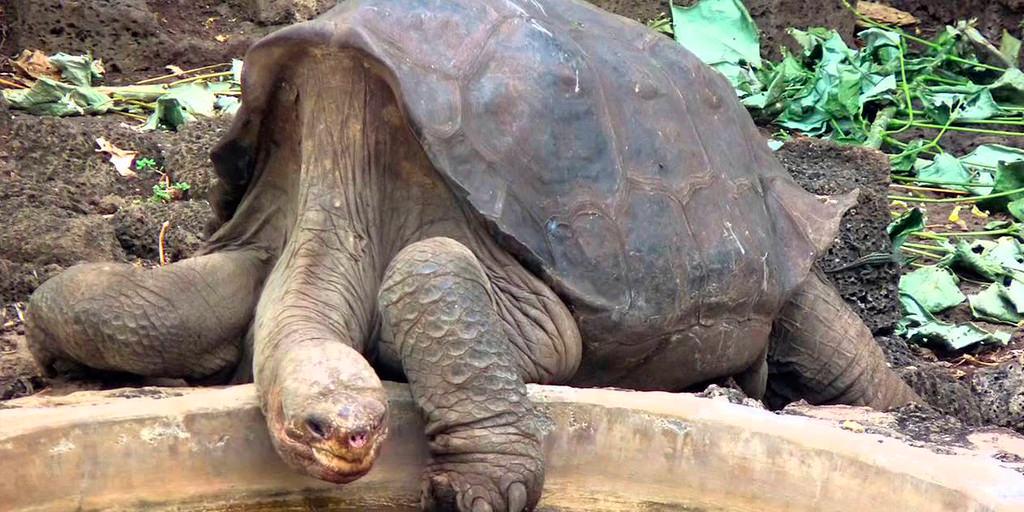The Galapagos Islands near Ecuador have been known for their wonderful ecosystem with the varied varieties of flora and fauna found here. There are a number of endemic species of animals that are found nowhere else in the world. A source of inspiration to the famous scientist Charles Darwin is a home to the rarest form of marine iguanas, Galapagos Penguins, Darwin’s Finches and the most famous Galapagos Tortoise.
It is with the presence of these rare species and the beautiful surrounding nature that forces people to take up a trip to this beautiful group of islands. The famous Galapagos tortoises found here are huge and can weigh up to about 400kg. The length of these huge creatures on an average is about 1.8 meters. This weight and length make them one among the 13th heaviest reptiles. The tortoises are said to live for about 100 years each. This makes them the longest lived vertebrate on earth.
The Galapagos Tortoises are spread across some 7 islands of the archipelago. They have been living here for years and were first discovered centuries ago. But, the largest among them, all were the Pinta tortoises that were found on the Pinta Island. With the change in the environment and the introduction of new species in this area, the tortoises were later found to be extinct. It was early in 1900’s that the Pinta tortoises were thought to be extinct.
But, in the year 1971, a Hungarian scientist came across the only living tortoise that belonged to this species. He was called Lonesome George. The discovery of Lonesome George ignited new hope among scientists. They tried everything possible to bring back the species that were extinct. George was later moved into the Charles Darwin Research Center on the Santa Cruz Islands. It was here that the scientists took good care of him and also placed two female tortoises of a similar sub-species.
This trial went on for years. It was in on the 24 June 2012, that Lonesome George breathed his last. He was about 100 years old when he passed away. While the Research center lost their most precious possession, the world lost its only existing Pinta Tortoise, who was known to have attracted many visitors and was also the most photographed tortoises of Galapagos Islands Ecuator tours and travels.
Another tortoise named, Pepe the missionary, a Galapagos Tortoise himself was first adopted by a family in the year 1940. After a few years with the family on the San Cristobal Islands, he was later donated to the Franciscan mission in 1967.
Another tortoise named, Pepe the missionary, a Galapagos Tortoise himself was first adopted by a family in the year 1940. After a few years with the family on the San Cristobal Islands, he was later donated to the Franciscan mission in 1967.
Ever since he has been living with the missionaries, Pepe was considered to be a mascot for them. He too was an attraction for the tourists who visited the mission. People loved taking a look at him and also click many photographs.
After the death of Lonesome George in 2012, Pepe the missionary was moved into the Charles Darwin Research Center. He was then taken care of by the officials. He too died on 22 August 2014 at the age of 60. Scientists said that it was a natural death since most of the organs in his body were not functioning properly. Moreover, Pepe was found to be a little overweight. Pepe was one among the species found on the Wolf volcano on the Isabela island. There are about 2000 more such tortoises living there.
The scientists have worked tirelessly for the past two years to preserve the body of Lonesome George. He is now placed in the American Museum of Natural History as a specimen of a species that is no more present on earth.
The scientists have worked tirelessly for the past two years to preserve the body of Lonesome George. He is now placed in the American Museum of Natural History as a specimen of a species that is no more present on earth.
A team of more than 60 scientists has worked together to make sure that the tortoise is preserved well. Lonesome George is kept on display in this museum and will be kept until January 4, 2015. He will later be moved to Ecuador.
There are some countless memories of Lonesome George and Pepe the Missionary that the officials at the Research center and all those who had an encounter with them cannot forget. Since both these tortoises died at a young age as compared to the others in their species, the tortoises are now considered to be an endangered species here in the Galapagos. While the government is putting in efforts to conserve the remaining species of tortoises, the officials and scientists at the Charles Darwin Research center are trying to breed them to increase their population.
There are some countless memories of Lonesome George and Pepe the Missionary that the officials at the Research center and all those who had an encounter with them cannot forget. Since both these tortoises died at a young age as compared to the others in their species, the tortoises are now considered to be an endangered species here in the Galapagos. While the government is putting in efforts to conserve the remaining species of tortoises, the officials and scientists at the Charles Darwin Research center are trying to breed them to increase their population.



Comments